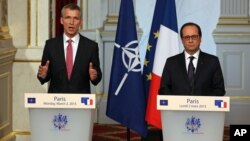Western leaders have called for a "strong reaction" from the international community if the Ukraine cease-fire accord reached last month in Belarus is not observed.
President Barack Obama; leaders from France, Germany, Britain and Italy; and Donald Tusk, head of the European Council, held a video conference Tuesday to discuss the developments in eastern Ukraine as well as global security issues.
Officials reviewed the role that observers and peacekeepers will play and the possibility of imposing additional sanctions on Russia for supporting Ukrainian separatists.
"Leaders will be ready to decide on further sanctions, if the Minsk agreements are further violated," a European Union statement said.
The United States and its European allies have accused Russia of exacerbating the conflict by sending troops and weapons to pro-Moscow separatists. Russia has repeatedly denied the charges.
Washington has said it still is considering the option of sending Kyiv lethal weapons.
Meanwhile, the violence in eastern Ukraine continued.
A series of internationally brokered agreements to end hostilities have largely been ignored. According to the latest U.N. report, the conflict in Ukraine has left more than 6,000 people dead.
On Monday evening, the leaders of Russia, Germany and France agreed to Ukraine's proposal to ask the Organization for Security and Cooperation in Europe (OSCE) to help with the implementation of the cease-fire agreement, officials said after a four-way phone call.
Russian President Vladimir Putin, Ukraine President Petro Poroshenko, German Chancellor Angela Merkel and French President Francois Hollande took part in the phone call. They said that there is an urgent need for an exchange of prisoners in the conflict region and for humanitarian aid, according to German government spokesman Steffen Seibert.
“As soon as the conditions have been fulfilled, the working group that was set up in Minsk should move forward in tackling further steps, such as preparing the local elections in the regions of Lugansk and Donetsk,” Seibert said in a statement after the call.
Seibert said that the four leaders also “welcomed progress with the agreed-upon cease-fire and the removal of heavy weapons.”
He said they agreed that OSCE should play a greater role as observers of the cease-fire agreement and the removal of weapons. They sent a request to the OSCE to publish a daily report on the current developments.
In Paris, Hollande's office said the four leaders had agreed to ask the OSCE to play a more direct role in order to improve the application of the cease-fire and the withdrawal of heavy arms.
Hollande said in a statement they had discussed the application of the Feb. 12 Minsk agreement. “Progress has been noted, but the situation needs to improve,” the statement said.
In Kyiv, Poroshenko said in a statement published on his website that the three other leaders supported Kyiv's proposal to put observers from the OSCE security watchdog into areas of eastern Ukraine where the cease-fire is not being observed.
In Moscow, the Kremlin stressed in a statement the importance of strict observation of the cease-fire, continuing the process of withdrawal of heavy weapons under OSCE supervision.
Some information for this report came from Reuters.





